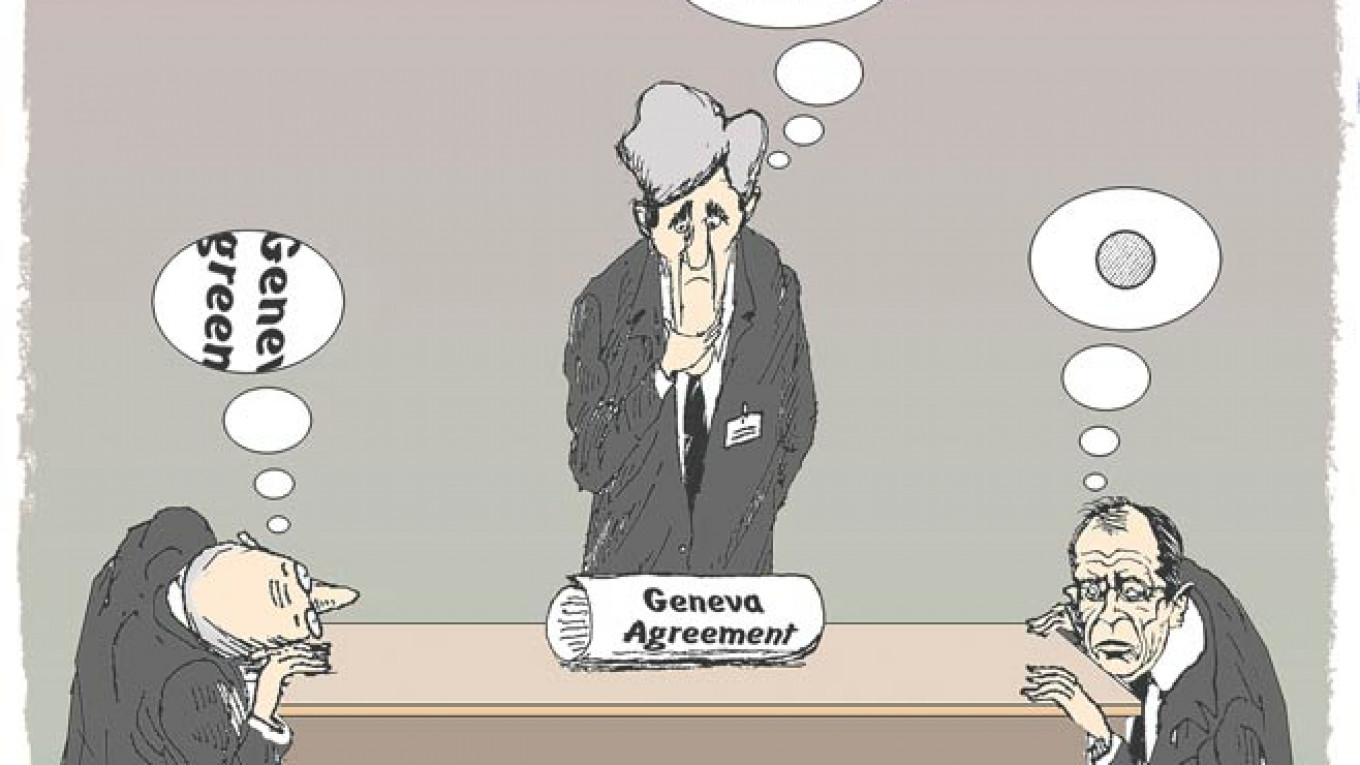The agreement on Ukraine that Russia, the European Union, U.S. and Ukraine reached in Geneva on Thursday is the first document in which all four parties expressed at least some degree of common interest. It provided a glimmer of hope that the Ukrainian crisis might cool down somewhat. At the same time, however, it does not offer the de-escalation that would stave off the second round of sanctions that Washington is threatening to impose against Moscow.
The Geneva agreement might have offerred a slight relief, but it did not generate serious hopes for resolving the crisis in Ukraine.
It is good that the EU, U.S. and Russia sat down at the same table together, and it is good that they have assumed some responsibility for complying with this fragile agreement. That is especially important considering that the interim government in Kiev lacks full control over the situation in the country.
At the same time, though, nobody should overestimate the significance of the Geneva agreement. The most alarming thing is that it took participants eight hours of intensive negotiations to formulate the text of what is essentially just a standard truce. Rumors even flew during the talks that the process might break down at any moment.
The finished document calls for disarming all militant groups and for militants to vacate the buildings they seized, while offering amnesty for rebels, except those who committed capital crimes. The agreement also calls for a "national dialogue" but fails to spell out who would participate in such a dialogue and what results it should produce. Neither does the document refer in any way to the presidential election slated for May 25 or to the possibility of canceling or rescheduling that election.
The document also fails to stipulate if constitutional reforms that will introduce elements of federalism and weaken the powers of the president should precede or follow the election and whether a referendum on those reforms will be held. Lavrov left the Geneva talks claiming that constitutional reform in Ukraine is inevitable. But his counterpart, U.S. Secretary of State John Kerry, said nothing to indicate that Washington shared that view.
One other problem is that the word "federalism" — perhaps the largest issue of contention between Kiev and the militants in the eastern regions — does not even appear in the document. The participants simply deferred that issue, referring only vaguely to some indefinite process of "national dialogue." But I seriously doubt the effectiveness of such a dialogue unless the same international mediators who met in Geneva will accompany the process throughout. Even before the current crisis, the Ukrainian political elite were renowned for their inability to reach an agreement among themselves and their habit of breaking obligations they had only just assumed.
Kerry said if Moscow did not take demonstrative steps to de-escalate the crisis by the weekend, Washington would impose a new round of sanctions. Therefore, whatever respite the Geneva agreement may have provided is doomed to be short-lived. Kerry's statement once again confirmed the U.S. position that the rebels in Ukraine's south and east are nothing more than Moscow's puppets, and that if the Kremlin would just stop meddling in those regions, the standoff would somehow dissolve.
But even if the pro-Russian militants really were receiving support from Moscow, it does not necessarily follow that they would stop protesting the moment they were told to do so. It would be just as unrealistic to imagine that Right Sector extremists would obey orders from the authorities in Kiev. The people occupying administrative building in eastern Ukraine have already declared that they will not leave until extremists leave the Maidan in Kiev and release buildings they have seized.
Obviously, it will be very difficult to disarm militant groups anywhere in the country. Only an outside force acting on behalf of the EU, U.S. and Russia would have the ability of forcing all militias to disarm. But the trust between Russia and the West has completely broken down, making such a cooperative arrangement all but impossible. This distrust is particularly acute over the issue of Ukraine, which has brought a new cold war right up to Russia's borders.
It seems that the crisis in Ukraine will have to get much worse before Washington and Moscow will understand that the only way to resolve the conflict is by cooperating and making concessions to each other. For now, though, it seems that Russia is holding its ground and simply waiting complacently to get slapped with additional sanctions.
The Geneva agreement might have offerred a slight respite, but it did not generate serious hopes for resolving the crisis in Ukraine.
Georgy Bovt is a political analyst.
A Message from The Moscow Times:
Dear readers,
We are facing unprecedented challenges. Russia's Prosecutor General's Office has designated The Moscow Times as an "undesirable" organization, criminalizing our work and putting our staff at risk of prosecution. This follows our earlier unjust labeling as a "foreign agent."
These actions are direct attempts to silence independent journalism in Russia. The authorities claim our work "discredits the decisions of the Russian leadership." We see things differently: we strive to provide accurate, unbiased reporting on Russia.
We, the journalists of The Moscow Times, refuse to be silenced. But to continue our work, we need your help.
Your support, no matter how small, makes a world of difference. If you can, please support us monthly starting from just $2. It's quick to set up, and every contribution makes a significant impact.
By supporting The Moscow Times, you're defending open, independent journalism in the face of repression. Thank you for standing with us.
Remind me later.







